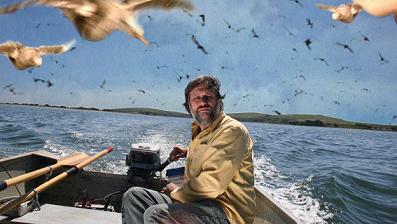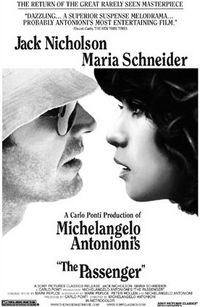 Philippe Noiret, with doubt one of the best French actors ever, died a few days ago. He is usually lauded for his performances in the classic Le Vieux Fusil and Marco Ferreri's scandalous La Grande Bouffe. But I have always liked him best in Bernard Tavernier's Coup de Torchon, a film lossely based on Jim Thompson's Pop 1280. Here he plays a sheriff living in a small French colonial village just before World War 2. He is usually considered a softy and gets ridiculed by everyone. Until he turns into an exterminating angel and starts killing just about everyone, with the aid of his mistress, played by an incredibly sexy Isabelle Hupert. And of course he gets away with it. The dialogs are pleasantly immoral and, as is the action. And true to French tradition it is actually one of the funniest films you have ever seen. Great movie. May he rest in peace.
Philippe Noiret, with doubt one of the best French actors ever, died a few days ago. He is usually lauded for his performances in the classic Le Vieux Fusil and Marco Ferreri's scandalous La Grande Bouffe. But I have always liked him best in Bernard Tavernier's Coup de Torchon, a film lossely based on Jim Thompson's Pop 1280. Here he plays a sheriff living in a small French colonial village just before World War 2. He is usually considered a softy and gets ridiculed by everyone. Until he turns into an exterminating angel and starts killing just about everyone, with the aid of his mistress, played by an incredibly sexy Isabelle Hupert. And of course he gets away with it. The dialogs are pleasantly immoral and, as is the action. And true to French tradition it is actually one of the funniest films you have ever seen. Great movie. May he rest in peace.
Showing posts with label Film. Show all posts
Showing posts with label Film. Show all posts
Saturday, November 25, 2006
Coup de Torchon [1981]
 Philippe Noiret, with doubt one of the best French actors ever, died a few days ago. He is usually lauded for his performances in the classic Le Vieux Fusil and Marco Ferreri's scandalous La Grande Bouffe. But I have always liked him best in Bernard Tavernier's Coup de Torchon, a film lossely based on Jim Thompson's Pop 1280. Here he plays a sheriff living in a small French colonial village just before World War 2. He is usually considered a softy and gets ridiculed by everyone. Until he turns into an exterminating angel and starts killing just about everyone, with the aid of his mistress, played by an incredibly sexy Isabelle Hupert. And of course he gets away with it. The dialogs are pleasantly immoral and, as is the action. And true to French tradition it is actually one of the funniest films you have ever seen. Great movie. May he rest in peace.
Philippe Noiret, with doubt one of the best French actors ever, died a few days ago. He is usually lauded for his performances in the classic Le Vieux Fusil and Marco Ferreri's scandalous La Grande Bouffe. But I have always liked him best in Bernard Tavernier's Coup de Torchon, a film lossely based on Jim Thompson's Pop 1280. Here he plays a sheriff living in a small French colonial village just before World War 2. He is usually considered a softy and gets ridiculed by everyone. Until he turns into an exterminating angel and starts killing just about everyone, with the aid of his mistress, played by an incredibly sexy Isabelle Hupert. And of course he gets away with it. The dialogs are pleasantly immoral and, as is the action. And true to French tradition it is actually one of the funniest films you have ever seen. Great movie. May he rest in peace.
Tuesday, November 21, 2006
The Pervert's Guide to Cinema
 I'm curious and then again not. The latter mostly because the choice of movies I've read about up till now is a little bit disappointing. Dr. Strangelove, The Birds, Blue Velvet, Psycho, The Matrix... so much has been said already about these movies and they have been analysed to the death. They are, on top, all films that are so blatantly connected with psychopathology and neurosis that it is difficult to imagine you might learn something new unless you are a complete novice to film theory and critique. More about it when I've actually seen it.
I'm curious and then again not. The latter mostly because the choice of movies I've read about up till now is a little bit disappointing. Dr. Strangelove, The Birds, Blue Velvet, Psycho, The Matrix... so much has been said already about these movies and they have been analysed to the death. They are, on top, all films that are so blatantly connected with psychopathology and neurosis that it is difficult to imagine you might learn something new unless you are a complete novice to film theory and critique. More about it when I've actually seen it.
Monday, November 13, 2006
Professione: Reporter (1975)
 As Omar pointed out last week when writing about Fellini's Roma, they don't make them like this any more. Antonioni in retrospect is probably, together with Ingmar Bergman and Alain Resnais, one of the few directors who has ever radically attempted to put an idea into film. It is probably also the foremost reason why he has always been considered too intellectual, even boring. True, as David Cook points out in his History of Narrative Film, his treatment of subject matter (in this case the question: what is identity?) is indeed virtually touching on the inhumane. It is as if the actors are no more than substrates for the concepts he is trying to introduce. And it is of course equally true that such treatment of actors and action is by most people not considered to be the ultimate goal of a movie.
As Omar pointed out last week when writing about Fellini's Roma, they don't make them like this any more. Antonioni in retrospect is probably, together with Ingmar Bergman and Alain Resnais, one of the few directors who has ever radically attempted to put an idea into film. It is probably also the foremost reason why he has always been considered too intellectual, even boring. True, as David Cook points out in his History of Narrative Film, his treatment of subject matter (in this case the question: what is identity?) is indeed virtually touching on the inhumane. It is as if the actors are no more than substrates for the concepts he is trying to introduce. And it is of course equally true that such treatment of actors and action is by most people not considered to be the ultimate goal of a movie.But then one would pass over the fact that art since the advent of modernism no longer has the duty to please. No, art has the duty to put relevant political questions on the table, a duty most artists seem to have forgotten all about in a time when words like 'idea' and 'intellectual' are thought of as cusswords and entertainment has taken the place of art, up to the point that most people have forgotten what the attributes of true art are. More to the point, art has to raise more questions than it is able to answer. Art is supposed to be an endless generator of ideas, so that, when the artwork is put outside of its original context, it continues to disseminate meaning.
That is the reason why Antonioni's movies are pure art, almost unto the brink of total detachment. Seldom before have I watched a movie that contains so much emblematic dialogue. Where in other movies conversations mostly follow the logic of the action, in The Passenger they follow the logic of ideas. In this movie you are not one moment tempted to view Nicolson as "that actor from Five Easy Pieces or The Shining". Rather he becomes a vehicle for Antonioni's filmic statements about loss of identity, alienation and the inability of communication. It comes as no surprise then that, at the end, although surrounded by people he loves (or pursued by those he used to love), he dies alone.
Subscribe to:
Posts (Atom)
